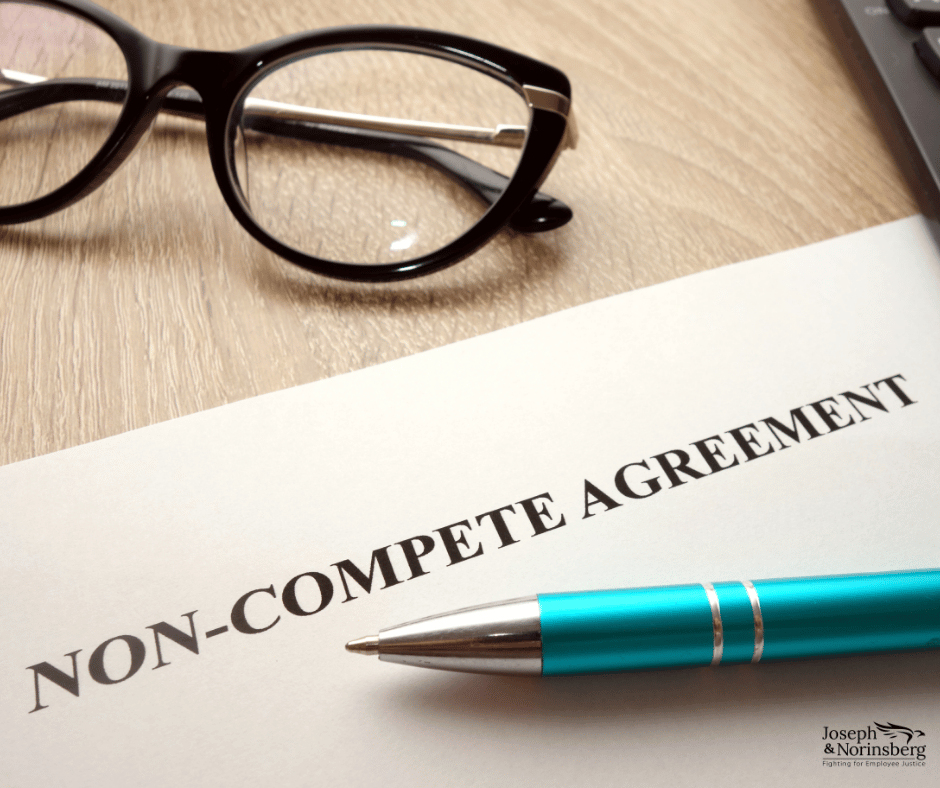Non-compete agreements can create a minefield of future difficulties for employees that can hinder their careers. Often hidden within employment contracts or severance agreements, non-competes prohibit workers from accepting similar jobs after leaving the company.
However, new protections may be on the horizon. The New York Senate recently passed Senate Bill S4641, a measure that could ban most non-compete agreements in the state. The bill is now pending before the New York State Assembly.
Table of Contents
- What is the Purpose of Non-Compete Agreements?
- How Does New York’s 2025 Non-Compete Ban Work?
- What Was New York’s Journey To Creating a Non-Compete Ban?
- Are Certain Employees Still Subject to Non-Compete Bans in New York?
- How Does New York’s 2025 Non-Compete Ban Affect Employees?
- What Should Employers Do To Prepare for the Non-Compete Ban?
- Contact Joseph & Norinsberg For Your Employment Law Cases
What is the Purpose of Non-Compete Agreements?
Senate Bill S4641 defines a non-compete as any agreement between an employer and employee that restricts the worker’s ability to find another job after ending their employment.
While intended to protect a company’s business interests from rivals, critics allege that non-competes allow employers to offer artificially low pay and benefits to workers, preventing them from accepting or pursuing better jobs due to the threat of legal action.
Non-solicitation agreements, which stop employees from poaching clients or co-workers after leaving a job, or non-disclosure agreements, which block them from sharing trade secrets or other confidential information, typically do not prevent workers from accepting employment in the same field or starting their own business. Non-compete agreements can potentially freeze out highly specialized workers from an entire field, forcing them to move or switch careers.
How Does New York’s 2025 Non-Compete Ban Work?
If signed into law, Senate Bill S4641 would ban non-compete agreements between employers and “covered individuals,” defined as anyone working for or in service to an entity they are “in a position of economic dependence on.” Those over a certain income threshold are not considered covered individuals, but licensed health care professionals are protected from non-competes under the bill regardless of how much they make.
It would apply to all applicable agreements signed or revised after that date, but wouldn’t invalidate any existing agreements that are otherwise legal.
What Was New York’s Journey To Creating a Non-Compete Ban?
The New York legislature has previously attempted to ban non-compete agreements through Senate Bill A1278B, which would have banned all non-compete agreements in any situation. The bill passed in June 2023, but Governor Kathy Hochul vetoed it that December , claiming the outright ban would be overly restrictive of businesses with legitimate interests in retaining “highly-compensated talent” in the state.
Senate Bill S4641, introduced in February 2025, is lawmakers’ latest attempt to respond to Hochul’s criticisms after she signaled a willingness to sign a more targeted ban. The bill passed the state senate in June 2025 and is now awaiting action by the assembly.
Are Certain Employees Still Subject to Non-Compete Bans in New York?
Senate Bill S4641 has a carve-out for “highly-compensated individuals,” defined as those with an average income of $500,000 or more over the previous three years. For those employees, companies may still enforce a non-compete agreement for a maximum of one year after the end of employment, but they must continue paying the workers’ salary for that entire period. As previously mentioned, most health care professionals are protected regardless of income.
There is also an exception for non-competes involving the sale of at least 15% of a company, so long as they are “reasonable in time, geography, and scope” and protect the other party’s legitimate business interests.
Under current law, non-compete clauses are legal. However, not all are enforceable. The law requires them to protect legitimate business interests, have reasonable limits, and not be overly broad or unduly restrictive.
How Does New York’s 2025 Non-Compete Ban Affect Employees?
The new law would ban all applicable non-compete agreements signed 30 days after it becomes law, protecting nearly all workers from unfair employment restrictions. Covered agreements signed or modified on or after this date would be rendered invalid. However, existing lawful non-compete agreements would remain in effect.
To enforce the law, the bill would allow an employee to sue a company for violating the non-disclosure ban. The statute of limitations is two years from the date the claimant signed a non-compete, learned of the agreement, ended their employment, or when the employer attempted to enforce it, whichever is later.
What Should Employers Do To Prepare for the Non-Compete Ban?
Companies must meet several requirements to comply with New York’s 2025 non-compete ban if it becomes law, including:
- Avoiding changes to any existing non-compete agreements, which would subject them to the new law and render them void
- Removing any non-compete clauses from employment contracts, severance agreements, or other documents
- Train HR and legal teams on the impacts of the law
- Post a visible notice to employees detailing how the new law impacts them and what protections they have
Contact Joseph & Norinsberg For Your Employment Law Cases
If your employer is subjecting you to an oppressive non-compete or non-disclosure agreement, the experienced New York employment lawyers at Joseph & Norinsberg can help. We’ll advise you of your legal options and take action to protect your rights.
Contact us online or call 212-227-5700 today for a free consultation.

